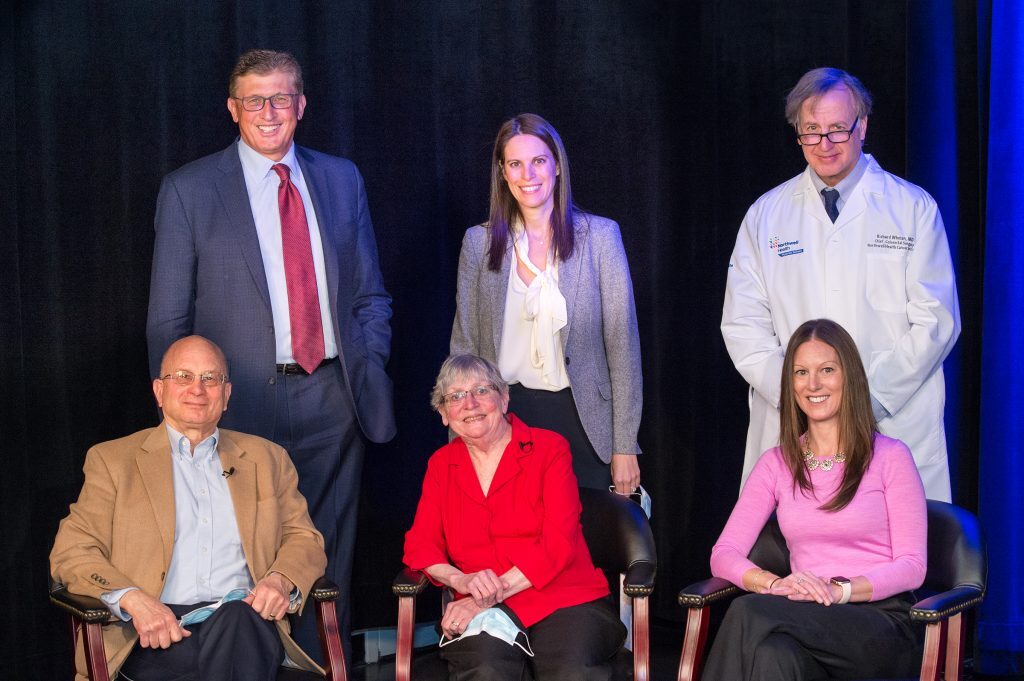March 8, 2021
Long Island Jewish (LIJ) Medical Center, in collaboration with the Northwell Health Cancer Institute, is testing the efficacy of delivering aerosolized chemotherapy to patients who currently have few treatment options, the second such clinical trial site in the nation. For 74-year-old Anita Wolf, of Lake Grove, NY, the novel therapy is a welcome development.

Known as pressurized intraperitoneal aerosol chemotherapy, or PIPAC, the clinical trial offers a new treatment technique that administers chemotherapy laparoscopically in the form of a pressurized aerosol. PIPAC is designed for use in patients with end-stage peritoneal surface malignancy (cancer deposits on the thin layer of tissue that lines and covers the stomach, intestines and most of the other organs within).
“This is an entirely new way of giving chemotherapy that combines minimally invasive surgery and an aerosol of chemo that is sprayed directly onto the surface of a tumor,” said Richard Whelan, MD, whose research was instrumental in bringing the trial to LIJ. “This technique provides many advantages to patients living with certain types of cancer; basically, it’s a simple minimally invasive procedure that takes less than an hour. Best of all, it has fewer side effects than the traditional method of providing chemotherapy because the drugs are not injected into the blood stream but instead are directly applied to the tumor deposits.”
Here’s how it works: During PIPAC, surgeons inject medication into the patient’s abdominal cavity through a nebulizer which is inserted through a laparoscopic port (less than an inch in diameter). The nebulizer turns the liquid medicine into a fine mist. Importantly, PIPAC can be combined with IV chemotherapy in which case the tumor is being attacked from several directions. City of Hope, a comprehensive cancer center near Los Angeles, is the lead investigator of the national, multisite clinical trial testing the efficacy of PIPAC.
Dr. Whelan noted that PIPAC is most often used when cancer in the patient’s digestive system or in the case of a woman, female reproductive organs, spreads to the lining of the intestines and abdominal cavity. It may be an option for patients with stomach, ovarian, colorectal, or appendix cancer if surgery to remove the cancer is not an option. PIPAC in this trial will be given 3 times to each patient at 6 week intervals. And, because the procedures are laparoscopic, the patients spend more time at home since they can usually go home the day after the PIPAC treatment.
All of this made Ms. Wolf a perfect candidate for PIPAC. Already a survivor of open-heart surgery in 2007, Ms. Wolf’s journey with cancer of the colon began in October 2019, when her daughter, Jennifer, urged her mother to go for a routine colonoscopy. The results were disappointing; Ms. Wolf was diagnosed with a stage 2A colon cancer that was soon surgically removed.
Further CAT scans in January 2020 found irregular masses on her liver, which meant that the cancer had spread. Her oncologist recommended a three-months of chemotherapy. After that treatment, Ms. Wolf underwent liver resection surgery in June followed by more chemotherapy.
Unfortunately, later tests revealed that the cancer had spread to the lining of the intestine and abdomen. Colorectal cancer accounts for the second-most cancer deaths in the United States. Ms. Wolf was told about the possibility of participating in a clinical trial in June that was being developed to help people who were running out of options with traditional treatments for these types of cancers.
Danielle DePeralta, MD, the surgical oncologist who is following Ms. Wolf’s care, was part of the surgical team (along with Dr. Whelan) who performed the PIPAC surgery on February 8th.
“At the time of her colon cancer diagnosis in 2019, the hope was for a cure, but the cancer returned- first in the liver and then the peritoneum. Fortunately, the liver tumor could be removed, but the areas of spread in the peritoneum continued to grow despite intensive chemotherapy,” said Dr. DePeralta. “Through all of her treatment, Ms. Wolf never seems to complain and manages to keep a positive attitude. Every time I see her, she says she feels great. She is a loving and courageous wife and mother. She is motivated both to control her own cancer, but also to contribute to our understanding of this disease so that we can better treat patients like her in the future.”
Ms. Wolf returned to the Northwell Cancer Institute on March 8th, one month to the day following her surgery. The date was also significant because it is recognized as International Women’s Day; this year’s theme is Women’s Courageous Stories. And, according to her medical team and her loving family, Ms. Wolf certainly is a woman of courage.
When asked about participating in a clinical trial for her illness, Ms. Wolf said, “I am honored to have the opportunity to do this. Hopefully, the knowledge acquired from my experience will help doctors and other patients in the future who are battling these forms of cancer.”